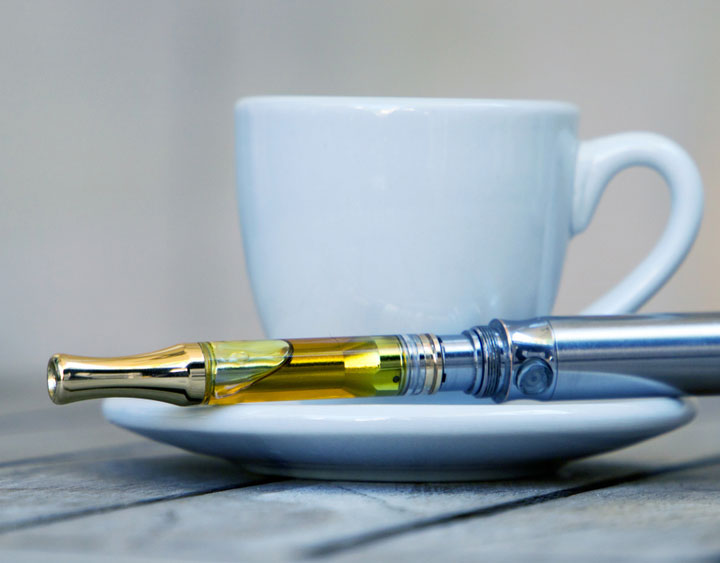You have probably seen or used a vaporizer with an oil cartridge. These easy-to-use portable devices are quickly becoming one of the most popular ways to take CBD. Widespread interest in both vaping and CBD continue to grow. In many states, vaping CBD is legal, which makes it an enticing option for those with busy schedules.
Vaping is often touted as everything from an anti-smoking agent to a safer alternative to cigarettes. Although the science is still out on that, one thing is sure: vaping is here to stay.
How Does a Vaporizer Work with CBD?
The vapor is produced by an electronic cigarette (e-cig) through an electric coil and then inhaled as an aerosol. Generally, the ingredients in an e-cig aim to mimic that of a traditional paper-rolled cigarette. When adding CBD to this mix, the sought-after effect is to mimic what a user might experience eating CBD gummies or taking a tincture, for example.
Heating a tincture to a high temperature and then inhaling it should not change the chemical profile of CBD. However, inhalation versus eating can alter the intended dosing. It is far easier to inhale more than intended, which is an important thing to keep in mind.
Current data suggest that most CBD users are female who seek to treat anxiety-related conditions. Most users purchase their vaping products from dispensaries, and nearly 60 percent of all CBD users prefer vaping to other means of use. A study of 2,400 users showed that half of them use CBD daily and are generally between the ages of 25 and 49. FDA regulation is yet to be defined, so being a careful consumer and reading product labels is imperative.
Ingredients: Fact vs. Fiction
The poor regulation of vape CBD products means that there is often no clear answer as to what is inside the tincture. Ranging from misrepresentation of the amount of CBD oil to using THC instead of CBD, you should always exercise caution when selecting a CBD vape brand.
During the vaporization process, heated cannabis oils mix with thinning agents to perform more efficiently in the vape device. When some thinning agents are heated, production of potentially harmful carbonyl compounds might occur. Research from the National Institute of Health reports that carbonyls are cancer-causing chemicals. These include formaldehyde, which is a Class 1 carcinogen. Byproducts of vaping CBD oil include the following:
- Medium-change triglycerides
- Polyethylene glycol 400
- Propylene glycol
- Vegetable glycerin
It is important to remember that not all of these harmful chemicals are found in all CBD vape oil. The most important thing you can do is to review carefully the list of ingredients and source your product from a reputable and well-known company.
Urban Legend and Antifreeze
A common urban legend that seems pervasive in the CBD and vaping community is that CBD oil contains antifreeze. This is because of the concern surrounding propylene glycol. Maybe you are more familiar with the chemical in the variety of household products such as cosmetics, baby wipes, pet food and yes, antifreeze. Propylene glycol exposure is part of the fabric of our daily lives and activities.
Here is the reality: Propylene glycol is a chemical often used in vape pens because of its thin, syrup-like properties. When inhaled, it can cause damage to the lungs. Long-term studies are not available, so toxicologists are not certain whether it is the propylene glycol or another agents within the CBD vape oil.
With a Generally Recognized as Safe (GRAS) label from the FDA, which may or may not count for much in your book, there is no current concrete evidence that propylene glycol is going to do any more damage to you than anything else in the world.
Potential Health Risks and Benefits
As with both e-cigs and CBD vaping, there are health risks. As society plays catch-up, there is very little regulation on the vaping market, meaning it is the Wild West in terms of quality and efficacy. Therefore, do your research and due diligence.
Most recently, public health officials issued two separate warnings related to the use of CBD vape oils. With reports of loss of consciousness, heart irregularities, nausea, headaches, vomiting and seizures. The unreliable quality of any CBD vape oil stems from the fact that there is no full-scale regulation of the market. This means that it is almost impossible to detail the extensive list of health risks.
Additionally, a recent study from Johns Hopkins found that during the heating of a vaping stem, some coils could leach significant amounts of heavy metals into the vapor that users inhale. There are currently no long-term studies that detail the effects of prolonged inhalation of heavy metals.
CBD is thought to be beneficial for a variety of health and wellness related conditions. These include general anxiety issues, depression, as well as benefits to the gut microbiome.
Body Systems Affected
Unlike THC, CBD does not bind directly to any brain receptors. This means that it can influence the endocannabinoid system through the inhibition of an enzyme. Enzyme FAAH is responsible for the endocannabinoid anandamide, which leads to an increase in the levels of anandamide in the brain. This molecule contributes to enhancing the mood.
In the brain, CBD targets the serotonin 1A receptor. One of the functions of this receptor is to control levels of anxiety and stress. CBD also targets the vanilloid receptor type 1, which is involved in pain sensation and inflammation. Because of the correlation between these brain systems and the benefits of CBD, it is reasonable to assume that there are positive synergistic effects of CBD on the body that may affect all systems.
Potential Treatment of Medical Conditions
Research suggests that CBD has a variety of significant therapeutic benefits for most people. Emerging studies highlight that individuals can sustain high doses of CBD for long periods of time with minimal side effects.
A double blind study of 12 participants showed that those who took CBD for anxiety had symptoms reduced. In addition, users of CBD report that for the treatment of anxiety, insomnia, and depression, there is a reduction in their symptoms. A Brazilian study of insomniacs demonstrates that CBD increased sleep and can possibly regulate REM sleep alteration. Large-scale human studies of the correlation between improved mood and CBD are not conclusive. However, animal studies are showing that CBD can be effective in the treatment of animals with depression as CBD has antidepressant effects.
Nevertheless, some studies have shown that CBD will have a negative effect on people. Rather than supporting and encouraging a feeling of calm, for these individuals, CBD does the opposite. Users report that CBD vaping can cause irritability, GI distress, breathing instances or heightened mental health conditions. Without precise regulation and identifiable successive product ingredients, it is all but impossible to find the safest CBD vaping oil on the market. Instead of ditching the vape entirely, become a conscious consumer. There is no real way to make a rational gauge of risk as almost all the products on the market may be contaminated in some way. Instead, approach CBD vaping with a measured dose of caution and an awareness of risk factors.




